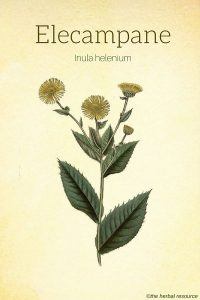Elecampane constituents are inulin, mucilage, volatile oil (helenin, camphor, alantol), alantoic acid, a thymol derivative, sesquiterpene lactones (including alantolactone, isoalantolactone), triterpenoid saponins, sterols, and bitter principles (possibly including dammaradienol, stigmasterol, friedlin), resin, pectin, and possible alkaloid.
Its actions are expectorant, antitussive, sedative, anthelmintic, diaphoretic, stomachic, antifungal, antiparasitic, relaxant, warming, tonic, alterative, diuretic and anti-bacterial.
There is a legend that tells how the name inula comes from Helen of Troy, whose tears turned into the healing plant known as elecampane.

Ancient Greeks and Romans considered elecampane as a cure-all for a broad range of ailments; it was considered a useful herbal remedy for dropsy, digestive upsets, menstrual disorders, and sciatica. Elecampane was used as an herbal cold remedy Elecampane (Inula helenium) – Illustration[/caption]In the 19th century, the roots were used to prepare cough drops, asthma lozenges and candy.
Medieval herbalists used the herb as the main ingredient in a digestive wine called “potio Paulina” after St. Paul’s suggestion to use a little wine for the stomach’s sake.
This plant has a long history in veterinary medicine as an effective remedy for skin diseases of sheep and horses. The veterinary use of elecampane is the origin of the herb’s other names, scabwort, and horseheal.
Elecampane was once listed in the U.S. Pharmacopeia and has been long valued as a tonic herb for the respiratory system. It was used traditionally as a specific remedy for chronic bronchitis and bronchial asthma. It was thought to soothe the bronchial tube linings and act as an expectorant.
Inula helenium is believed to be useful in any respiratory condition which produces copious mucus discharge and it is specifically indicated in the irritating cough of bronchitis, especially in children.
Inula helenium was traditionally used to treat the cough of pulmonary tuberculosis. Research has shown that the volatile oil is active against the tubercle bacillus.
The volatile oil stimulates the mucociliary escalator and circulation, while the saponins stimulate the removal of mucus from the lungs.
The constituents alatolactone and other related compounds have expectorant, secretolytic and antitussive actions; these have also demonstrated antibacterial and antifungal qualities.
For the treatment of respiratory problems, elecampane combines well with marribium, tussilago, asclepias and achillea.
It is a traditional remedy for worms; the constituent alantolactone has been used as an anthelmintic in the treatment of roundworm, threadworm, hookworm and whipworm infestation.
Chinese research has demonstrated a mild antibacterial action of the herb as well as a stimulating effect on the nervous system, digestion, and adrenal cortex.
Elecampane is used as a flavoring agent in digestive liqueurs and vermouth, it is used in candy and is often added to cough tinctures and pastilles.
Herbal Resource
Latest posts by Herbal Resource (see all)
- What is Maritime Pine Bark used for? - December 23, 2023
Leave a Reply